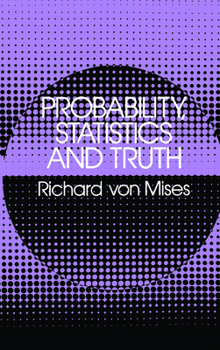Probability, Statistics and Truth
Select Format
Select Condition 
Book Overview
The science of probability -- the systematic study of mass phenomena and repetitive events -- was not fully established as such until about 1919. Nine years later, Richard von Mises, one of it pioneers, brought out the first edition of this book -- what has become the classic treatment of the foundations of probability theory. The present text reproduces the most authoritative translation of the definitive 1951 German edition, which was fully revised in the light of over two decades of developments in the field.
Step by step, in clear, simple language and with exceptionally well chosen examples, the author unfolds what in all likelihood is still the most comprehensive investigation ever undertaken of probability, its relation to statistic, and its truth-finding value. Professor Richard von Mises (1883-1953) was a world-renowned mathematician, aeronautical scientists, and positivist philosopher. Like all of his books, this one is rigorously logical and systematic, and at the same time thoroughly grounded in empirical evidence and practical situations.
First, Professor Mises derives a logically clear concept of probability and applies it to the idea of a "collective." He takes into account all the significant earlier approaches -- from that of Pascal to those of Laplace, Poisson, Venn, Keynes, and others. He devotes particular attention to the theories that appear to contradict his own. Then he determines "the task of probability calculus in mathematical statistics." The Laws of Large Numbers, the theory of errors, and many other relevant topics are thoroughly explored. Professor Mises brings his lucid conceptualizations to bear on virtually every significant practical application of probability and statistics -- from "absolutely safe" gambling systems, through the sex distribution of infants, to the phenomena of radioactivity.
Despite its sophistication, this book requires no knowledge of higher mathematics. Yet physicists will appreciate its substantial discussion of the crucial place of statistical problems in modern physics. And workers using statistics in any field will find here the most lucid treatment of the foundations, limitations, and potentials of a tool which has become absolutely essential in the physical and social sciences.
Step by step, in clear, simple language and with exceptionally well chosen examples, the author unfolds what in all likelihood is still the most comprehensive investigation ever undertaken of probability, its relation to statistic, and its truth-finding value. Professor Richard von Mises (1883-1953) was a world-renowned mathematician, aeronautical scientists, and positivist philosopher. Like all of his books, this one is rigorously logical and systematic, and at the same time thoroughly grounded in empirical evidence and practical situations.
First, Professor Mises derives a logically clear concept of probability and applies it to the idea of a "collective." He takes into account all the significant earlier approaches -- from that of Pascal to those of Laplace, Poisson, Venn, Keynes, and others. He devotes particular attention to the theories that appear to contradict his own. Then he determines "the task of probability calculus in mathematical statistics." The Laws of Large Numbers, the theory of errors, and many other relevant topics are thoroughly explored. Professor Mises brings his lucid conceptualizations to bear on virtually every significant practical application of probability and statistics -- from "absolutely safe" gambling systems, through the sex distribution of infants, to the phenomena of radioactivity.
Despite its sophistication, this book requires no knowledge of higher mathematics. Yet physicists will appreciate its substantial discussion of the crucial place of statistical problems in modern physics. And workers using statistics in any field will find here the most lucid treatment of the foundations, limitations, and potentials of a tool which has become absolutely essential in the physical and social sciences.
Format:Paperback
Language:English
ISBN:0486242145
ISBN13:9780486242149
Release Date:September 1981
Publisher:Dover Publications
Length:244 Pages
Weight:0.66 lbs.
Dimensions:0.5" x 5.4" x 8.4"
Customer Reviews
2 ratings
Rare discussion by a statistician & easy to read
Published by Thriftbooks.com User , 25 years ago
I recommend this book to anyone who is interested in the meaning of statistics. Statistics is based on probability theory, which in turn is dependent on a very specific definition of 'probability'. As such, statistical interpretation should always reflect this definition. This book clarifies the meaning of probability and its impact on statistical reasoning.It covers the 'grey area' of statistics, too often ignored in university texts. This book is very easy to read and does not require much exposure to mathematical probability/statistics. The central ideas of the book are applied to 'practical' applications in Physics, which makes it even more interesting.For the price, it is a great buy!
great frequentistic work
Published by Thriftbooks.com User , 26 years ago
This outstanding presentation of the frequentist interpretation of probability should be read by all seeking an understanding of what a probability really =is=. One need not accept frequentism (and I do not) to profit greatly from this work.





